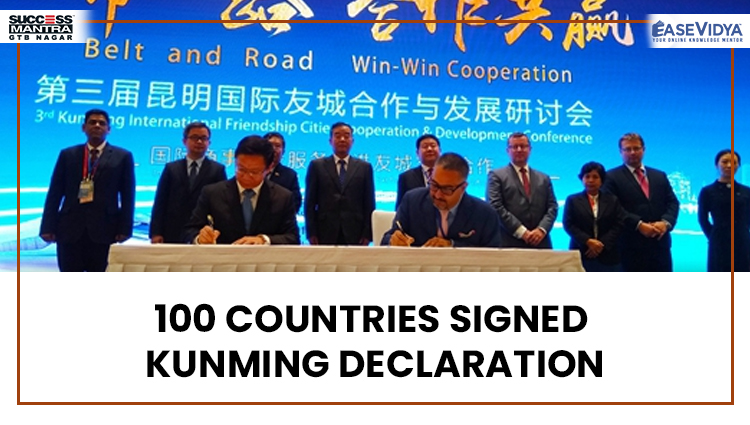
100 COUNTRIES SIGNED KUNMING DECLARATION
100 COUNTRIES SIGNED KUNMING DECLARATION
Recently, the Kunming Declaration was adopted by over 100 countries at the ongoing 15th Conference of the Parties to the United Nations Convention on Biological Diversity in china. The adoption of the declaration will create momentum for a new global biodiversity pact. In a previous agreement, Strategic Plan for Biodiversity 2011-2020, signed in Aichi, Japan, in 2010, governments agreed on 20 targets to try to slow biodiversity loss and protect habitats by 2020.

Current Affairs Notes By Success Mantra Coaching Institute GTB Nagar Delhi CLICK HERE
ABOUT THE DECLARATION
It calls for urgent and integrated action to reflect biodiversity considerations in all sectors of the global economy but crucial issues - like funding conservation in poorer countries and committing to biodiversity-friendly supply chains have been left to discuss later. It is not a binding international agreement. It calls upon the parties to mainstream biodiversity protection in decision-making and recognise the importance of conservation in protecting human health. The theme of the declaration is Ecological Civilization: Building a Shared Future for All Life on Earth. By adopting this, the nations have committed themselves to support the development, adoption and implementation of an effective post-2020 implementation plan, a capacity building action plan for the Cartagena Protocol on biosafety. The Protocol seeks to protect biological diversity from the potential risks posed by living modified organisms resulting from modern biotechnology. As per the declaration the signatory nations will ensure that the post-pandemic recovery policies, programmes and plans contribute to the conservation and sustainable use of biodiversity, promoting sustainable and inclusive development.
30 BY 30 TARGET
The declaration made a reference to the '30 by 30' target which is a key proposal being debated at the COP15, that would afford 30% of the Earth’s land and oceans protected status by 2030. Apart from this, the goal to halve the use of chemicals in agriculture and stop creating plastic waste is also being debated.
Kunming Biodiversity Fund: China has also pledged to inject USD 233 million into a new fund to protect biodiversity in developing countries. The fund is being referred to by China as Kunming Biodiversity Fund. It is the right step in this direction. However, some countries have reservations regarding this fund. Some countries have called this fund as “a drop in the bucket” given that China is the world’s biggest polluter. Further, some rich country donors say a new fund for conservation is unnecessary because the United Nations’ Global Environment Facility already helps developing nations finance green projects.
GLOBAL INITIATIVES TO SAVE BIODIVERSITY
- Convention on Biological Diversity: It is a legally binding treaty to conserve biodiversity that has been in force since 1993. India is a party to the convention.
- Convention on International Trade in Endangered Species of Wild Fauna and Flora: It provides public, private and non-governmental organisations with the knowledge and tools that enable human progress, economic development and nature conservation to take place together. India is a member of the convention.
- World Wide Fund for Nature: It is an international non-governmental organisation for the conservation, research and restoration of the natural environment.
- Global Biodiversity Assessment: It is an independent, critical, peer reviewed scientific analysis of the current issues, theories and views regarding the main aspects of biodiversity.
- Man and the Biosphere Program: It was launched in 1970 and has initiated programmes and activities focusing on the diversity and the resources provided by nature, humans' impacts on biodiversity, as well as how biodiversity affects human activities.
- Climate Financing: Climate finance refers to local, national or transnational financing—drawn from public, private and alternative sources of financing—that seeks to support mitigation and adaptation actions that will address climate change.

SOME GLOBAL CLIMATE FUNDS
- Green Climate Fund (GCF): It was established to limit or reduce Greenhouse Gas (GHG) emissions in developing countries and to help vulnerable societies adapt to the unavoidable impacts of climate change.
- Adaptation Fund (AF): It was established under the Kyoto Protocol in 2001 and has committed USD 532 million to climate adaptation and resilience activities.
- Global Environment Fund (GEF): GEF has served as an operating entity of the financial mechanism since the Convention came into force in 1994. It is a private equity fund focused on seeking long term financial returns by investments in clean energy under climate change.
- Kyoto Protocol: The Kyoto Protocol is an international agreement linked to the UNFCCC, which commits its parties by setting internationally binding emission reduction targets. The Kyoto Protocol was adopted in Kyoto, Japan in 1997 and entered into force in 2005. It recognized that developed countries are principally responsible for the current high levels of GHG emissions in the atmosphere as a result of more than 150 years of industrial activity. The detailed rules for the implementation of the Protocol were adopted at COP-7 in Marrakesh, in 2001 and are referred to as the Marrakesh Accords. Kyoto Protocol Phase-1 (2005-12) gave the target of cutting down emissions by 5%. Phase- 2 (2013-20) gave the target of reducing emissions by at least 18% by the industrialized countries.
- Additional Funds: In addition to providing guidance to the GEF and the GCF, parties have established two special funds: The Special Climate Change Fund (SCCF) and the Least Developed Countries Fund (LDCF). Both funds are managed by the GEF.

PRAVAHINI Current Affairs Notes By Success Mantra Coaching Institute GTB Nagar Delhi CLICK HERE
WORLD WILDLIFE DAY
- The day has been celebrated every year on the 3rd of March, since 2013. The date chosen coincides with the day the Convention on International Trade in Endangered Species of Wild Fauna and Flora (CITES) was signed in 1973. The United Nations General Assembly resolution also designated the CITES Secretariat as the facilitator for the global observance of this special day for wildlife on the UN calendar.
- Theme: The theme of World Wildlife Day 2021 is Forests and Livelihoods: Sustaining People and Planet. It is set in alignment with the UN Sustainable Development Goals.
- In India: On this occasion, the Union Environment Ministry declared that it is dedicated for the reintroduction of the Cheetah, which went extinct in 1952.
ABOUT UNFCCC
The United Nations Framework Convention on Climate Change (UNFCCC), signed in 1992 at the United Nations Conference on Environment and Development also known as the Earth Summit, the Rio Summit or the Rio Conference. India is among the select few countries to have hosted the COP of all three Rio conventions on climate change (UNFCCC), biodiversity (Convention on Biological Diversity) and land (United Nations Convention to Combat Desertification). The UNFCCC entered into force on 21st March 1994, and has been ratified by 197 countries. It is the parent treaty of the 2015 Paris Agreement. It is also the parent treaty of the 1997 Kyoto Protocol. The UNFCCC secretariat (UN Climate Change) is the United Nations entity tasked with supporting the global response to the threat of climate change. It is located in Bonn, Germany.
Objective: To achieve stabilization of greenhouse gas concentrations in the atmosphere at a level that would prevent dangerous repercussions within a time frame so as to allow ecosystems to adapt naturally and enable sustainable development.
The Conference of the Parties (COP): COP is the apex decision-making authority of UNFCCC. The COP meets every year, unless the Parties decide otherwise. The first COP meeting was held in Berlin, Germany in March, 1995. The COP meets in Bonn, the seat of the secretariat, unless a Party offers to host the session. The office of the COP President normally rotates among the five United Nations regional groups which are - Africa, Asia, Latin America and the Caribbean, Central and Eastern Europe and Western Europe and Others. The President is usually the environment minister of his or her home country. S/he is elected by acclamation immediately after the opening of a COP session.













0 Comment